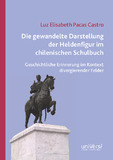Citation link:
http://dx.doi.org/10.25819/ubsi/10087Files in This Item:
| File | Description | Size | Format | |
|---|---|---|---|---|
| Dissertation_Pacas_Luz.pdf | 34.55 MB | Adobe PDF |  View/Open |
| Dokument Type: | Doctoral Thesis | metadata.dc.title: | Die gewandelte Darstellung der Heldenfigur im chilenischen Schulbuch | Title addition: | Geschichtliche Erinnerung im Kontext divergierender Felder | Other Titles: | The Transformation of Hero Figure Representation in Chilean Textbooks – Historical Memory in the Context of Divergent Fields | Authors: | Pacas Castro, Luz Elisabeth | Institute: | Fakultät I Philosophische Fakultät | Free keywords: | kollektive Erinnerung, Helden, collective memory, heroes | Dewey Decimal Classification: | 860 Spanische und portugiesische Literaturen | GHBS-Clases: | FRW IJZ |
Issue Date: | 2023 | Publish Date: | 2023 | Source: | Siegen: universi - Universitätsverlag Siegen, 2023. - ISBN 978-3-96182-117-4 | Abstract: | Heldenfiguren sind wichtige Referenzpunkte kollektiver Erinnerung und nationaler Identität. Das Schulbuch, als Medium der Geschichtskultur, ist dabei einerseits Produkt und andererseits Vermittler gesellschaftlicher Prozesse. Die vorliegende empirische Arbeit beleuchtet anhand einer Analyse von Schulbüchern aus den Jahren 2009 bis 2016 unterschiedliche Formen der Geschichtsvermittlung in Chile. Fokussiert werden die historische Phase der Entdeckung Amerikas mit ihren Figuren Christoph Kolumbus und Ferdinand Magellan und die der Unabhängigkeitswerdung Chiles mit ihren zentralen Figuren José Miguel Carrera, Manuel Rodríguez und Bernardo O‘Higgins. Dabei werden zwei unterschiedliche Bereiche der Schulbuchproduktion in Chile in den Blick genommen: der private Sektor und der staatliche Sektor. Diese beiden Sektoren spiegeln die gesellschaftliche, sozialstrukturelle Differenzierung des Landes wider. Die Schulbuchanalyse zeigt als zentrales Ergebnis eine chilenische Erinnerungskultur, die in den unterschiedlichen Sektoren gespalten, dabei aber nicht polemisch ist. Es wird der empirische Nachweis konträrer Heroisierungs- und Entheroisierungsprozesse erbracht. Die Ableitung unterschiedlicher Narrationsformen (traditionell, pluralistisch, kritisch-interkulturell) und Darstellungstypen der Heroisierung sind weitere Resultate der Arbeit. Neben der empirischen Analyse der Schulbücher wurden die Kontextbedingungen der Schulbucherstellung über Experteninterviews herausgearbeitet. Chile, als bildungspolitisch aufstrebendes Land, ist als interessanterer Fall zu betrachten. Die Erinnerung an die koloniale Vergangenheit zeigt sich im öffentlichen Raum als ambivalent. Die Studie wurde in den Kontext der aktuellen postkolonialen Debatten in der Wissenschaft eingebettet. Heroic figures are important reference points of collective memory and national identity. The textbook, as a medium of historical culture, is both, a product and a mediator of social processes. The present empirical study analyses textbooks from 2009 to 2016 to shed light on different forms of history education in Chile. The focus lies on historical phases of the Discovery of America with its figures Christopher Columbus and Ferdinand Magellan and on the phase of Chile's independence with its central figures José Miguel Carrera, Manuel Rodríguez and Bernardo O'Higgins. The work examines two different sectors of textbook production in Chile: the private sector and the state sector. Both reflect the social, socio-structural differentiation of the country. As a central and important result the textbook analysis reveals a Chilean culture of memory that is divided among the different sectors, yet not polemical. The work also delivers an empirical evidence of contrasting processes of heroization and de-heroization. Further results of the analysis are the derivation of different narrative forms (traditional, pluralistic, critical-intercultural) and types of heroization. In addition to the empirical analysis of textbooks also the contextual conditions of textbook production were taken into account via expert interviews with relevant stakeholders. Chile, as an emerging country in terms of educational policy, is to be considered a very interesting research case. The memory of the colonial past is shown to be ambivalent in the public sphere. The study was embedded in the context of current postcolonial debates in academia. |
DOI: | http://dx.doi.org/10.25819/ubsi/10087 | URN: | urn:nbn:de:hbz:467-21752 | URI: | https://dspace.ub.uni-siegen.de/handle/ubsi/2175 | License: | http://creativecommons.org/licenses/by-sa/4.0/ |
| Appears in Collections: | Hochschulschriften Universi |
This item is protected by original copyright |
Page view(s)
403
checked on Dec 26, 2024
Download(s)
78
checked on Dec 26, 2024
Google ScholarTM
Check
Altmetric
This item is licensed under a Creative Commons License


